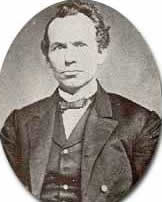 |
William H. Sylvis (1828-1869) was born in Armagh, Indiana County, Pa. After his father, a wagon maker, lost his business following the financial panic of 1837, Sylvis hired himself out to neighbor, first as a helper around the house (when he was 11) and then as farm hand.
By the time he was 17 he had returned home to work in his father’s wagon-shop, and the following year he left home to learn the iron-molding trade. After becoming a journeymen, he attempted to run his own foundry. When that effort failed he worked again as a journeyman, traveling in search of work and finally settling down in Philadelphia. Although the iron industry was growing rapidly in the mid-19th century, skilled iron molders like Sylvis saw their wages cut when employers hired |
unskilled workers as production “helpers.” Hoping to improve conditions, Sylvis joined the Journeymen Stove and Hollow-Ware Moulders’ Union of Philadelphia in 1857 when the union called a strike to demand higher wages. Elected secretary of his local union within a few months, Sylvis began corresponding with other local union leaders to promote the idea of creating a national union. His work paid: The National Union of Iron Molders was organized in 1859 with Sylvis as treasurer.
The outbreak of the Civil War almost destroyed the new union. But after Sylvis completed his service with the Pennsylvania militia, around 1863, he took off on a national organizing campaign to build support for the fledgling union. “'IN UNION THERE IS STRENGTH,'” He believed, "and in the formation of a national organization, embracing every moulder in the country . . . lies our only hope. Single-handed we can accomplish nothing; but united there is no power of wrong we may not openly defy." Taking his message to the nation's wage earners, Sylvis helped organize the National Labor Union in 1866, to fight for shorter hours and higher wages and to support producer cooperatives and land and currency reform laws. Elected NLU president in 1868, Sylvis wanted the NLU to function as a workingman's political party, since neither the Democrats or the Republicans had labor's interests at heart. However before he could see where that experiment would lead, he died on July 27, 1869. Read quotations from Sylvis on the labor question To learn more about Sylvis's life read his obituary and visit this website |